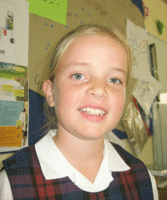Features
Jessica Reiher
3 May 2011
Children in the Gifted and Talented class at St Theresa’s school Plimmerton, GATE, are calling on New Zealand to follow the example of other some countries and ban the use of plastic bags.
 St Theresa’s wants New Zealand to be like Taiwan, Bangladesh and others that have banned plastic bags. Three of the children researched plastic bags and found that the petroleum in one plastic bag is enough to drive a car 115 metres. They also found out that New Zealanders use over three million plastic bags a day. Plastic bags are not biodegradable, they are photodegradable which means that they take 450 years to break down in the sun when they turn into an orange or black liquid.
St Theresa’s wants New Zealand to be like Taiwan, Bangladesh and others that have banned plastic bags. Three of the children researched plastic bags and found that the petroleum in one plastic bag is enough to drive a car 115 metres. They also found out that New Zealanders use over three million plastic bags a day. Plastic bags are not biodegradable, they are photodegradable which means that they take 450 years to break down in the sun when they turn into an orange or black liquid.
Up to 100,000 marine animals, mostly whales, seals and turtles, die each year from getting tangled in or inhaling plastic bags. Scientists say that of 50 albatrosses which were found dead, 45 had eaten plastic.
The class has sent letters to local supermarkets, asking that we become like Collingwood in Golden Bay, New Zealand’s first plastic bag-free town. Instead of using plastic bags, shoppers take their own cloth bags to the supermarket.
The class has been studying ‘waste’ and thinking about ways to encourage others to help protect the environment.
The school has a worm farm and recycling bins and every afternoon pupils join a rubbish duty session to clean up the school. The school is also considering bringing in guinea pigs and solar panels, to be more eco-friendly.
GATE visited Eastern Hutt school to work alongside the GATE children there and to learn about solar panels. Eastern Hutt has 12 solar panels, enough to run a normal house. The type of solar panels they had were called ‘photovoltaic’ from the word photo, meaning light and voltaic, electricity.
Maggie, the teacher from Genesis Energy and School Gen, showed them a mini solar panel and they put it outside, connecting it to a special battery in turn connected to a light. When the battery had enough power, the light flashed on.
Maggie also showed them a house on Christmas Island, where there is no electricity. This house had 13 solar panels while others had only one or two, which meant that the inhabitants could have only one light on at the same time as the TV, or one light plus the oven.
Last of all, Maggie showed them where the solar power is stored.
The children have realised that people have been careless in not thinking about what can happen to the things we use nowadays. For example, glass and polystyrene never break down in a landfill.
If people keep using things unwisely and polluting, which damages the food chain and reduces the number of things the environment provides, the Earth will not be a good place to live on.
The kids want everyone to help look after our planet by using materials wisely. They are encouraging people to reuse and recycle plastic and plastic bags.
After reading this, what are you going to with your lunch wrapper today? Or are you going to use a reusable container?
Eight-year-old Jessica Reiher (pictured) is in the Gifted and Talented class at St Theresa’s School, Plimmerton.
See also: Stewardship of Creation starting with life’s elixir